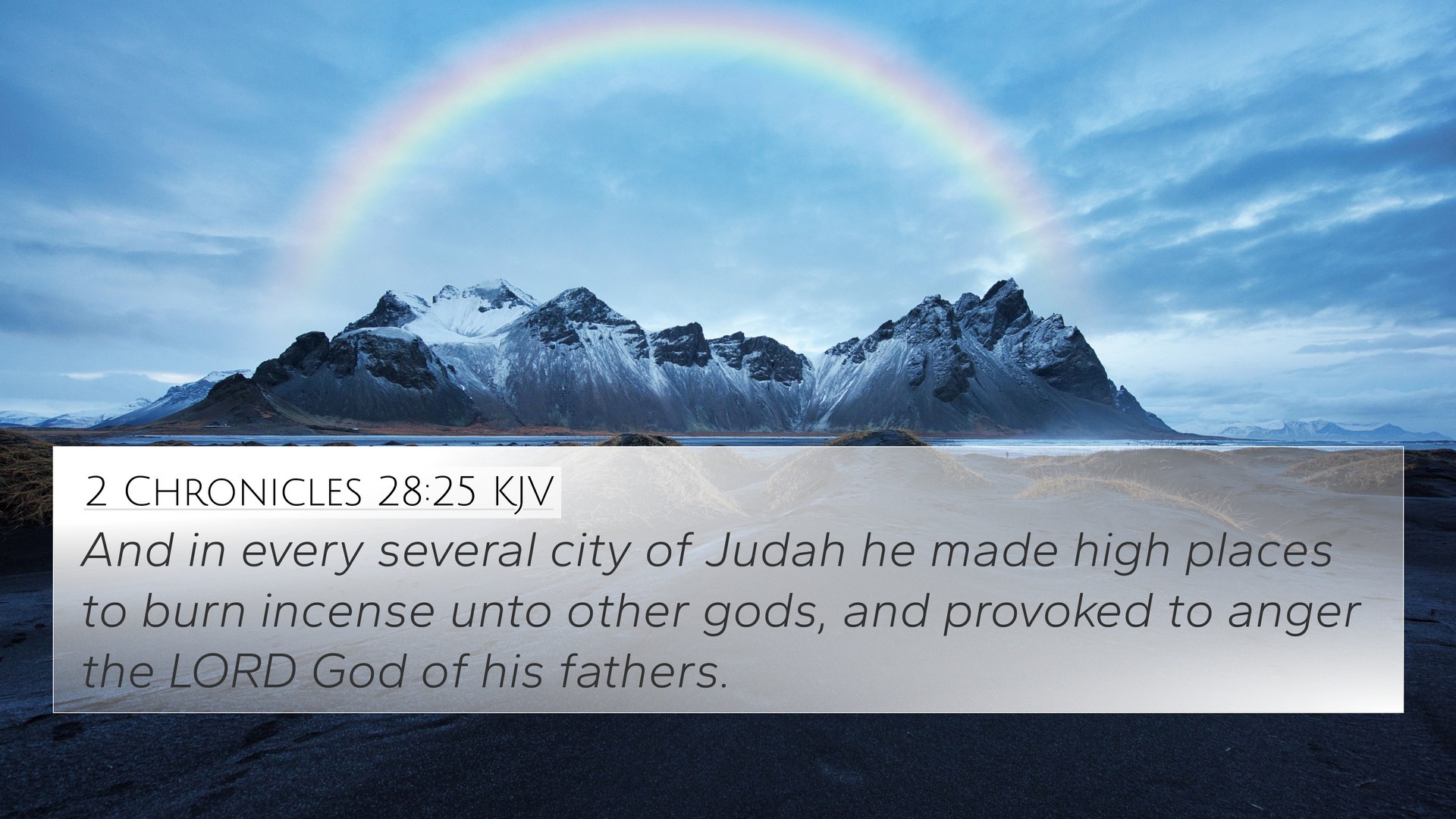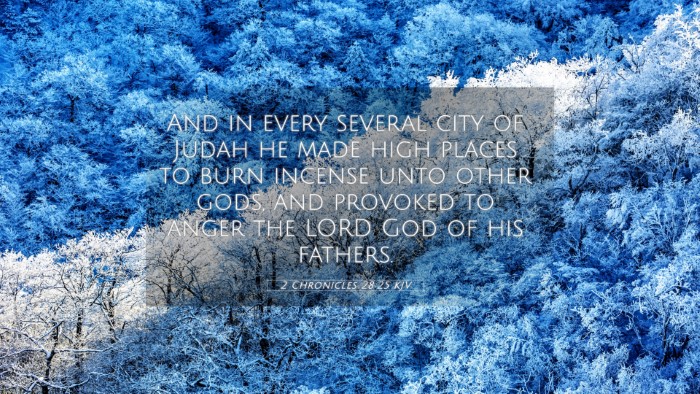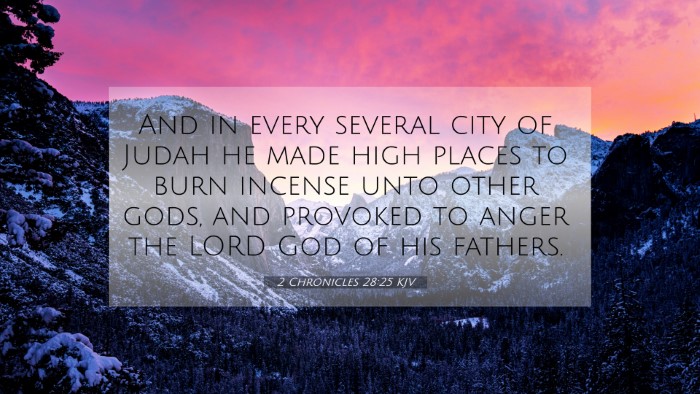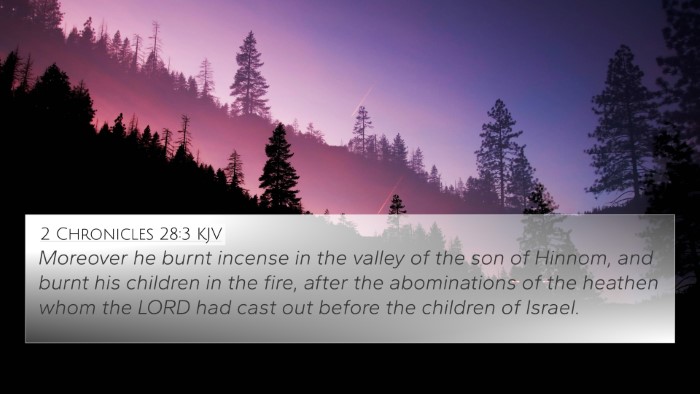Understanding 2 Chronicles 28:25
2 Chronicles 28:25 states: "And in every city of Judah he made high places to burn incense unto other gods, and provoked to anger the Lord God of his fathers." This verse portrays the actions of King Ahaz of Judah, who turned away from the worship of God and instigated further sin among the people.
Contextual Overview
This verse comes within the historical narrative of Judah's kings, specifically highlighting Ahaz's reign which was characterized by idolatry and unfaithfulness. Ahaz not only neglected true worship but also led the nation into further corruption, provoking God's anger.
Commentary Insights
-
Matthew Henry's Commentary:
Henry emphasizes that Ahaz's idolatry, particularly his establishment of high places, reflects a direct rebellion against God's commandments. This action was not only personal sin but was significant as it influenced the entire nation, prompting them to stray away from the worship of Yahweh.
-
Albert Barnes' Notes:
Barnes considers the extent of Ahaz's sins, explaining that he introduced pagan practices that led to widespread idol worship. This verse illustrates the consequences of rejecting God's guidance and the resultant divine displeasure that follows a nation in rebellion.
-
Adam Clarke's Commentary:
Clarke highlights the high places as symbols of spiritual decay and degradation within Judah. He notes that the burning of incense to other gods was an affront to the covenant relationship Israel had with the Lord, showcasing utter disregard for their spiritual heritage.
Thematic Connections
2 Chronicles 28:25 can be explored through several connecting themes found in scripture, providing a window into the pervasive issue of idolatry throughout the Bible.
Bible Verse Cross-References
- 2 Kings 16:3: Details the similar idolatrous actions of Ahaz, providing a parallel account of his unfaithfulness.
- Isaiah 7:1-2: This passage indicates the political and spiritual turmoil during Ahaz's reign, setting the stage for understanding the context of his decisions.
- Jeremiah 32:35: Reflects on the historical trend of Israel and Judah's turning to idolatry and God’s condemnation of such acts.
- Exodus 20:3-5: The clear commandment against idolatry underscores the unfaithfulness exhibited by Ahaz, showcasing the violation of God's law.
- 1 John 5:21: A New Testament reflection that warns believers to avoid idols, emphasizing the ongoing relevance of the issue of idolatry.
- 2 Chronicles 28:23: Prior to this verse, it explains that Ahaz sought help from other nations, further exemplifying his lack of trust in God.
- Deuteronomy 12:2-3: God's commandments regarding worship remind us of the consequences of establishing personal altars outside of His directives.
Links to Other Biblical Themes
Several major themes emerge as we examine the implications behind Ahaz’s actions in 2 Chronicles 28:25:
- Idolatry: The continuous struggle against idolatry throughout the Old Testament demonstrates the persistence of turning away from God.
- Divine Judgment: God's anger signifies the serious nature of sin and the inevitable judgment that follows disobedience and rebellion.
- Historical Repetition: The cyclical nature of Israel and Judah’s history—their constant oscillation between faithfulness and idolatry—provides a moral lesson for future generations.
Conclusion
In conclusion, 2 Chronicles 28:25 serves as a sobering reminder of the dangers of idolatry and the repercussions of leading others astray. The insights from various commentaries illuminate the severity of Ahaz's actions, prompting readers to reflect on the importance of faithfulness to God and His commandments.
Study and Reflection
Bible cross-referencing can aid in deepening understanding of themes such as idolatry, faithfulness, and divine judgment by linking relevant scriptures. Utilizing tools for bible cross-referencing can strengthen study and personal application, enriching one's spiritual journey.
Inter-Biblical Dialogue
Understanding the connections between the Old and New Testament can offer profound insights into the nature of worship and God's enduring relationship with His people. By exploring the historical and thematic contexts of passages such as 2 Chronicles 28:25, readers can better grasp how God's messages transcend time, informing Christian belief and practice today.



